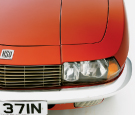The NSU Ro 80 represents a failed revolution. The new engine concept unveiled by the unusual engineer Felix Wankel (1902–88) in 1954 was a response to an ancient ambition among inventors to create an ‘ideal’ smooth rotary engine without up-and-down piston movement. Wankel sold the concept to the German NSU company, which then used it to build both motorcycles and small cars.
Wankel considered himself the third in a line of great German internal combustion engineers, following Nikolaus Otto (1832–91) and Rudolf Diesel (1858–1913). Surprisingly, though, he was not interested in close collaboration with NSU – once it had bought his patents – and remained aloof as it began to turn the invention into a practical thing.
The Wankel engine was turbine-smooth and looked, to many, like the future. NSU entered into manufacturing agreements with car companies around the world, including General Motors and Citroën (GM committed a reported $50 million to its licence). NSU showcased the new motor in the Ro 80 – a new mid- to luxury-level saloon. Voted ‘Car of the Year’ by motoring writers, it was highly advanced in conception and performed beautifully in every way. However, the engines, which had worked well in prototype testing, failed so often in service that German Ro 80 drivers used to hold up one, two or three fingers when passing each other to show how many engines they’d had under guarantee.
Eventually, the company gave up the unequal struggle and the NSU name was allowed to fade, out of embarrassment perhaps, while the partner Audi brand was reinstated. The Wankel may have proved a disaster, but selling licences perhaps underpinned the success of Audi today.


A marvellous car – shame about the engine. How the faults of the Wankel motor escaped detection in prototype testing is one of the enduring mysteries of automotive history.